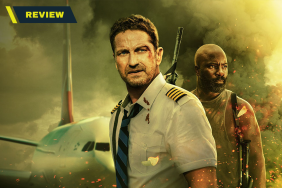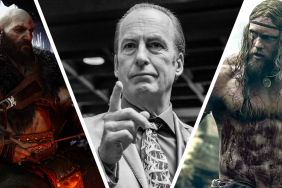
“The oil is treacherous, because it reflects the sky.” Herzog says in voice over as we look upon what could very easily be small ponds and streams of water in an otherwise barren wasteland. Herzog speaks to this very thought adding, “The oil is trying to disguise itself as water.” It’s a statement only Herzog could make and it’s one of the few heard throughout the brisk 50 minutes that make up his 1992 documentary Lessons of Darkness, which I think is best described as a cousin to Ron Fricke‘s wonderful wordless documentaries Baraka and Samsara, though with this film Herzog has a much more specific topic he’s exploring.
Broken into thirteen separate sections, all with their own “chapter” heading, Herzog tells the story of the 1991 Kuwait oil fires through sparse voice over (much of which are words read from the Bible), aerial and on the ground images captured on 16mm and classical music from Mahler to Verdi. We’re never given specifics in time telling us when, or exactly where what we’re seeing was shot, nor does he even attempt to include subtitles as a woman who watched her two sons tortured to death attempts to tell us something even though she can no longer speak since the incident.
It’s the images alone Herzog wants us to pay close attention to. Images of oil rising high into the atmosphere, boiling and blazing. Images of smoke plumes that can be seen for miles and the story from a mother telling the story of how soldiers removed her child from bed, pressed down on his head with his boot and she had to beg for them to stop. The child, which she holds in her arms, hasn’t spoken since. What exactly does Herzog want us to take away from these images and stories? What should we take away?
The images of the burning, smoke-filled oil fields offer a picture of horror. While so often we focus on what humans will do to their fellow humans, but what of what humans will do to the world around them?
Of course, the film could very easily be misunderstood. Herzog envisions Lessons of Darkness as a sci-fi story, seeing the images of the burning planet as images we wouldn’t recognize as our planet even though we know that’s exactly what it is. His interpretation of the film is to see it through these alien eyes and the best example of which is quite possibly the most haunting moment and words within the film’s “narrative”.
After having watched the exhaustive process of workers capping a well, a scene where the sound of the raging open well snaps shut and the instant silence is deafening, Herzog switches to another scene, a scene in which he declares the two men within the frame mad. As black oil streams into the sky from an open well, a firefighter sets the plume of oil ablaze. Over this imagery Herzog says, “Has life without fire become unbearable for them?”
In the book “Herzog on Herzog“, interviewer Paul Cronin asks Herzog about this scene explicitly and he answers:
The voice-over says something like, ‘Seized by madness, they reignite the flames because they cannot imagine a life without fire, and now there is something to extinguish they are happy again.’ There was actually a practical reason for igniting the flame because in this case the gush of oil had created a lake which was approaching other burning fires, and had the oil been ignited by other fires there would have been an even bigger problem. I asked them to let me know when they were going to reignite the flame so I could be there with a camera. I am a storyteller, and I used the voice-over to place the film – and the audience – in a darkened planet somewhere in our solar system.
In the same interview Herzog calls the film “a requiem for a planet that we ourselves have destroyed”, which is to say we shouldn’t necessarily look at each scene with documentary meaning behind it, though I think interpreting each scene with a “scorched Earth” sensibility isn’t outside the realm of reason.
Herzog never makes mention of the Gulf War, but you don’t need that context to be horrified. Women and children shocked into silence as Herzog keeps the camera focused on their faces, proving the film’s lack of dialogue by showing the power of a face without words. He begins with an aerial shot of Kuwait City at dawn, a seeming tranquility immediately interrupted by War and what will soon be blackened soil, and just as we see the fires extinguished and an oil well capped, the fire is reignited as if to say we’re a society either unwilling or unable to learn from past horrors.
In the end I guess we’re left to wonder, if there’s nothing to fight against does the bulk of humanity see any reason to live at all?









